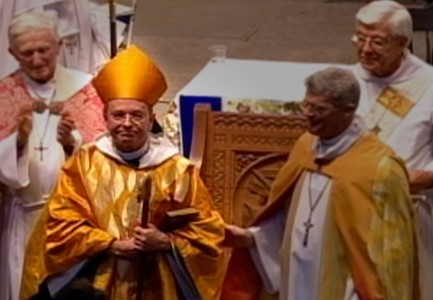
I had somewhat mixed feelings while watching this new documentary, which cuts to the heart of anti-gay sentiment in the United States by zeroing in on the alleged source of so much of it—what the Bible has to say on the subject of the morality of homosexuality.
It’s a powerful piece of filmmaking by director and co-writer Daniel G. Karslake, who has sit-down interviews with a half-dozen different religious families, starting with the straight parents and telling their story before even introducing their gay or lesbian child. Each of these story arcs is compelling enough to support a documentary of its own. Built atop these are interviews with theologians and at least one celebrity member of the clergy (Hey look, it’s Archbishop Desmond Tutu!); plenty of painstakingly gathered, archival footage; man on the street-type interviews with passersby; and an educational cartoon sequence about the current state of the science of homosexuality.
Karslake’s film will alternately amuse, infuriate and inspire, when it’s not breaking your heart or demolishing religious arguments against homosexuality that claim to be supported by the Bible, most of which you’ve (hopefully) heard before. In the entire book, there’s only about a half-dozen mentions of homosexuality all together, Jesus never once mentions it, there was no word for homosexuality in the modern sense in the original languages the books of the Bible were written in, the same book that calls men lying with men “an abomination” also calls eating shrimp “an abomination,” and so on.
My mixed feelings came from the tone of the film, which is at times quite glib, and, as a piece of rhetoric goes, certainly one-sided. For The Bible Tells Me So seems far more interested in preaching to the choir rather than trying to convert the “God Hates Fags” crowd, and no fundamentalists or conservative experts are brought in to explain why it’s okay to discriminate against gays, or why gay sex or gay love is a sin.
Of course, is it even worth engaging such folks in a conversation? By even supposing that there are two sides to an issue like whether or not gay people should be treated like human beings, do we not cede too much ground to extremists? It’s worth noting that this is what the national news media does, as we’ve seen so much evidence of during the last few rounds of the marriage debate. If you give equal time and attention to both sides of the argument in the interest in objectivity, even when one side is much smaller and less logical than the other, don’t you just end up subjectively warping the debate, which may not even be a debate as much as a bunch of crazy, angry, and/or scared people with differing opinions from the mainstream?
There’s some truly priceless footage in here making fun of such anti-gay types, including a man on the street who confesses to not knowing what the Bible says about gay people but that he’s sure it’s bad, Jimmy Swaggart boasting how he’d kill any man that looked lustfully at him while he’s holding a Bible in his hand, and a 1977 clip of Anita Bryant taking a pie to the face and praying to God to forgive the person who threw it at her—seconds after mentioning her desire to “do away with” the gays and laughing that “At least it’s a fruit pie.”
Such glimpses of the Religious Right are about all we hear from their “side” of the argument, but then, the personal, family stories told by a gay men and women and their parents do reflect varying opinions and conflicting emotions, and it is here that For The Bible Tells Me So is on the surest footing. In each and every case, the families are extremely religious, and all of the parents were angry and upset with their children for coming out to them for quite a while.
One father, David Poteat, laughingly recounts, “When my kids were growing up, I said, ‘God, please don’t let my son grow up to be a faggot and my daughter a slut.’ And he did not do that. He reversed it.”
Another mother, who took the advice of Focus on the Family’s James Dobson, rejects her daughter completely when she came out to her as a lesbian.
But they and their kids take us through their journeys, and it’s genuinely surprising where they all end up. The Poteats still aren’t comfortable with their daughter being a lesbian, but they accept her back into their lives. Several of the other parents, including the one who once took parenting cues from Dobson, actually become activists.
Aside from putting a personal face on the tension between organized religion and gay people that telling these stories from a family perspective accomplishes, it’s also a somewhat subversive tactic, that infuses the film with drama, as some of kids end up being ones you’ve probably heard of, even if you don’t remember the names or recognize their childhoods at first.
One is Chrissy Gephardt, daughter of Democratic congressman and one-time presidential candidate Dick Gephardt. Another is Gene Robinson, who would grow up to be the first openly gay bishop in the Episcopal Church, and the center of one of the bigger firestorms of the last few years.
It’s a pretty neat trick, borrowing the structure of fictive storytelling to lend even more drama to a documentary, and giving an almost Hollywood happy ending to at least a few of the stories.
For The Bible Tells Me So screens Wednesday, November 14, at 7 p.m. and 9 p.m. at the Wexner Center’s film/video theatre. It will also screen Thursday, November 15, at 7:30 p.m. in Mershon Auditorium. Click to wexarts.org for more info.


2 responses to “Film Review: For The Bible Tells Me So”